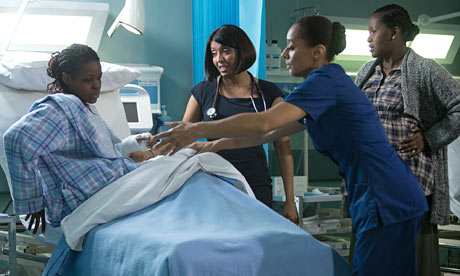
BBC's Casualty is not a programme known for its light touch. It doesn't tiptoe around issues – it bashes down their door and runs through them with boots on. In Casualty, cars are leather-seated smash-smash machines. In Casualty, windows are brittle mouths of doom. If I were mayor of the fictional town of Holby I would pedestrianise the hell out of it. I'd compress every tower block into a bungalow and enforce compulsory parachutes for everyone with cause to climb a ladder. But Casualty's lack of subtlety, its very black-and-whiteness, is why it was exactly the right forum to address female genital mutilation for the first time in British drama.
This is what happened on BBC1 at 9.10pm on Saturday, with 5 million people watching. Tamasha wanted to protect her little sister from being cut like her. The doctors were debating whether to get involved: "It's too culturally sensitive," argued one. "It's complex." "Typical liberal excuse," replied the nurse. Meanwhile the sisters' pregnant mother was going into early labour, and upon inspecting her, Dr Hanna learned she was "closed". In one of those great flashes of Casualty karma, when Tamasha caught up with the private doctor on his way to the cutting party and ran him off the road in her mother's car, he suffered massive trauma to his genitals. Dr Hanna and Tamasha drove to a terraced house, where, in the absence of the private doctor, two little girls had been cut by their grandmother – one lay unconscious in a pool of blood and urine.
There were some concerns online before it aired, commenters saying the BBC shouldn't show the story because it would be upsetting viewing, and it was – it was upsetting. But this isn't the time for Newsnight or Panorama. This is the time for family TV, for faces we recognise, for blood and broad strokes of script. There's little room for subtlety any more. Not when we're talking about the removal of more than 66,000 women's clitorises in the UK alone, with 20,000 more (16,000 of whom are under 15) at risk. About the cutting of their labia, sometimes the sewing up of their vaginas, leaving only a tiny opening for blood and urine.
It's partly because of this – the language required to talk about it – that discussion about FGM remains in the serious bits of the paper, only alluded to on grown-up television and debated in Parliament. It's partly because of this, and partly because it's seen as a potentially incendiary problem, with teachers and doctors reluctant to intervene for fear of appearing racist or interfering in traditions they don't quite understand.
Germaine Greer once argued that attempts to outlaw genital mutilation amounted to "an attack on cultural identity", and she wasn't alone. Over time, advocates for cultural self-determination have quieted slightly as human rights arguments have been clarified, but there's still the worry. That by calling social services when you suspect that your student's summer holiday (for this is when it often happens) will involve her being held down by six women while her genitals are cut, you will come across as insensitive. Yet if there was the real threat of a child being blinded, say, or a limb amputated, you would react at speed.
Despite it being illegal to perform FGM here, and to take children out of the country to have it performed, there has never been a single conviction. The lack of arrests says terrible things about our ignorance, our apathy and, crucially, our ideas about female sexuality.
So yeah, the time for subtlety has passed. The law isn't working – traumatised children are not calling the police on their mothers, who believe they're doing the best for their daughters. Girls are still being cut. This is the time for noisy statements on prime-time TV. This is what drama is for. And Casualty, with its bright lights and clanking scripts, has timed its action just right. Because it's getting warmer. The summer holidays are close.
On the Web
Email Eva at e.wiseman@observer.co.uk or visit theguardian.com/profile/evawiseman for all her articles in one place. Follow Eva on Twitter@EvaWiseman

